Develop a Flight Booking App in 2024: Cost, Features, Tech Stack
Hey there! Are you ready to soar to new heights in the world of mobile applications? Picture this: you're sitting comfortably, scrolling through your smartphone, effortlessly booking flights with just a few taps. That's the power of a flight booking mobile app. In today's fast-paced travel industry, these apps have become a game-changer, offering convenience and flexibility like never before.

Whether you're planning a weekend getaway or a globetrotting adventure, having the right app in your pocket can make all the difference.
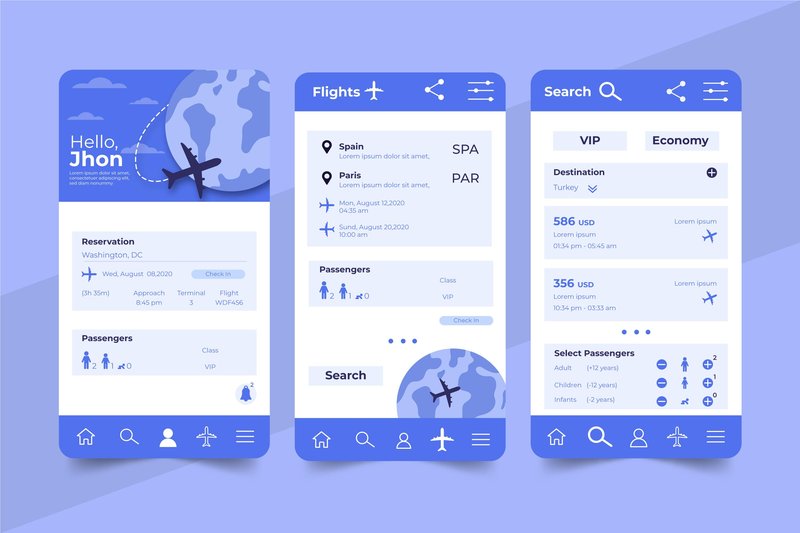
So, fasten your seatbelts as we embark on a journey to explore the ins and outs of building a stellar flight booking mobile application. Ready for takeoff? Let's dive in!
Crunching Stats about Flight Booking App Market
- The global revenue in the travel segment of the app market is $1.02 billion in 2022 and it is forecasted to continuously increase between 2023 and 2027, whereas it will touch roughly $1.96 billion in 2027. Statista
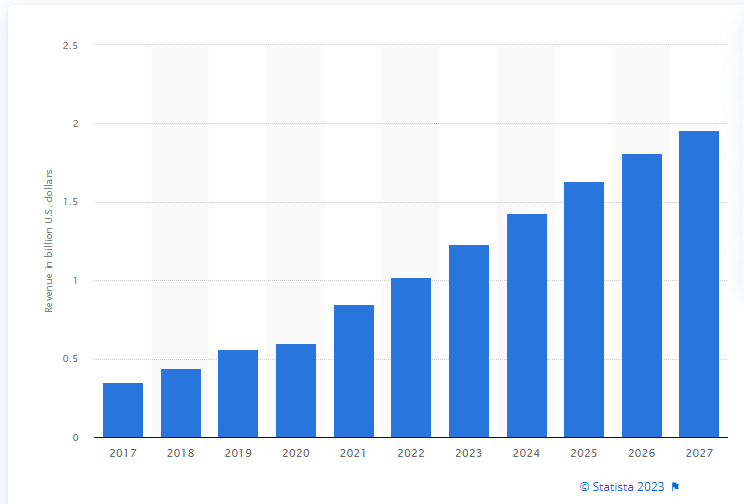
- Approximately 75% of global travelers prefer using mobile apps to book their flights. Business of apps
- Mobile apps with features like real-time flight tracking and virtual reality tours are driving innovation in the flight booking app market, enhancing the overall user experience.
- 79% of Users expressed appreciation for price alerts, which they felt added value to their flight buying experience.
These facts, statistics, and trends highlight the significant growth, revenue potential, and technological advancements in the flight booking app market, demonstrating its importance in the travel industry.
The Advantages of Using a Flight Booking Mobile App
Let's talk about why having a flight booking mobile app in your pocket is like having a personal travel genie.
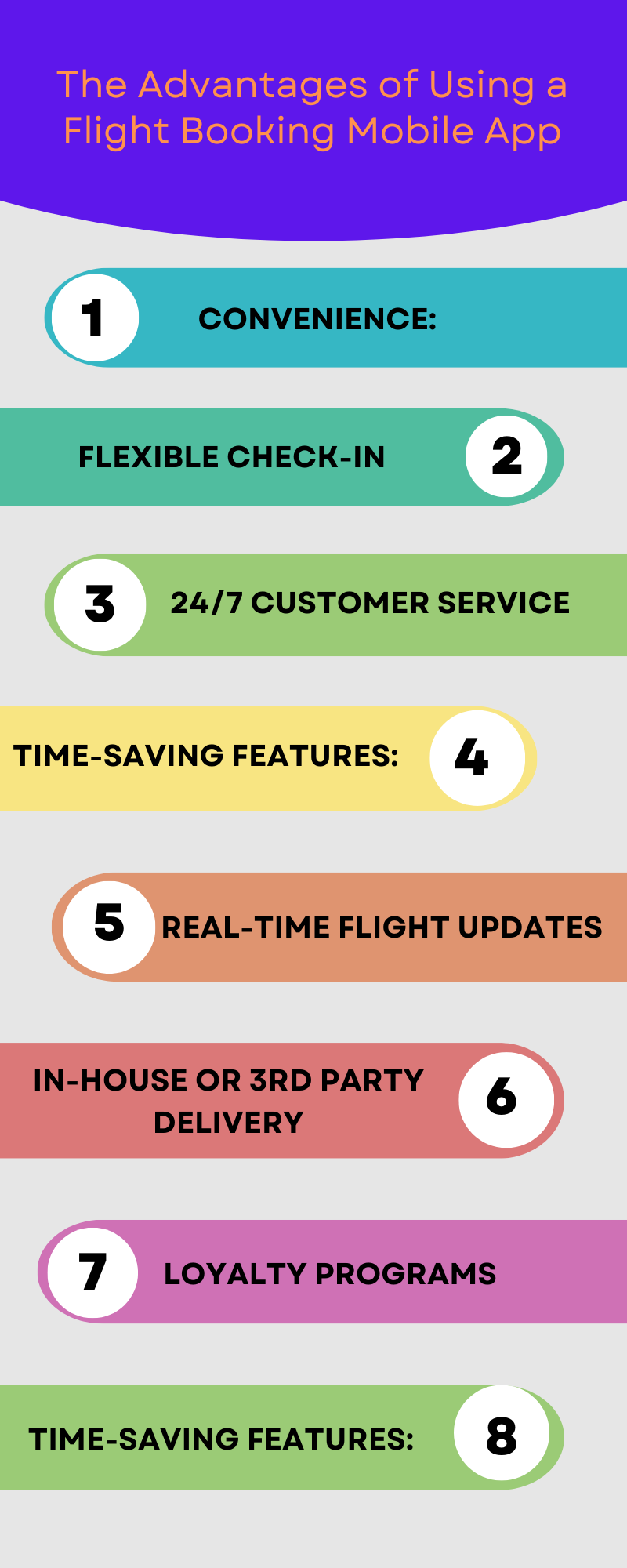
- Convenience: Book flights with a few taps, avoiding long queues and desktop searches.
- Flexible Check-In: Choose check-in times that suit your schedule, eliminating the stress of strict deadlines.
- 24/7 Customer Service: Get round-the-clock assistance for bookings, flight schedules, and inquiries.
- Time-Saving Features: Quick search filters and pre-filled information streamline the booking process.
- Real-Time Flight Updates: Receive instant notifications about flight delays, gate changes, and other important updates.
- Personalized Recommendations: Get tailored suggestions for flights, destinations, and deals based on your preferences.
- Loyalty Programs: Access and manage loyalty programs directly within the app, earning rewards and exclusive benefits.
- Offline Access: Retrieve and view your bookings, flight details, and itineraries even without an internet connection.
Business Models for Mobile Flight Booking Applications
Let's explore two popular models: the aggregator model and the dedicated model.

Aggregator Model:
This model acts as a middleman, consolidating flight data from various airlines and travel agencies into one platform.
It offers users a comprehensive view of available flights, prices, and options. By leveraging partnerships and APIs, aggregators simplify the booking process and provide users with a wide range of choices.
Take Skyscanner, for example. They aggregate flight information from multiple sources, enabling users to compare and book flights seamlessly.
Dedicated Model:
In contrast, the dedicated model focuses on catering to a specific niche or target audience.
These apps offer specialized services and features tailored to meet specific travel needs. For instance, an app exclusively targeting business travelers might provide features like expense tracking, corporate discounts, and seamless integration with travel management systems.
Navan is a prime example of a dedicated flight booking app that caters to the corporate travel market.
Flight Booking App Development Process
Building a flight booking app requires a systematic approach to ensure a successful outcome. Let's break down the step-by-step process of developing a flight booking mobile application.

Application Design:
Start by designing an intuitive and user-friendly interface that offers a seamless booking experience. Consider elements like easy navigation, clear booking flows, and visually appealing layouts.
Platform Selection:
Choose the right platform for your app, whether it's iOS, Android, or both. Consider factors like target audience, market share, and development resources to make an informed decision.
Dynamic Functionality:
Incorporate dynamic functionality that adapts to changing market trends and user demands. Stay updated with the latest features and technologies to provide a competitive edge. For example, integrating real-time flight tracking or personalized recommendations based on user preferences.
Involvement of App Developers:
Collaborate with experienced app developers who specialize in mobile app development. Their expertise will be crucial in building a robust and efficient flight booking app. Work closely with the development team to ensure the smooth execution of the project.
Integration of Mobile Wallets:
Simplify the payment process by integrating secure and widely accepted mobile wallet options. This allows users to make quick and hassle-free transactions within the app. Examples of popular mobile wallets include Apple Pay, Google Pay, and PayPal.
Features Customers Look for in a Flight Ticket Booking App
When it comes to a flight booking app, customers have certain expectations and desired features that enhance their overall experience. Let's discuss the essential features that customers look for:
1. Customer Panel Functionalities:

Seamless Login/Sign-up:
Enable users to easily access the app by allowing them to log in or sign up using their social media accounts, eliminating the need for lengthy registration processes.
Flight Schedules:
Provide users with comprehensive and up-to-date flight schedules, allowing them to view available flights, departure/arrival times, and choose the most convenient options.
Hassle-free Flight Reservation:
Streamline the flight reservation process by offering a user-friendly interface that allows customers to book their flights seamlessly and efficiently.
Frequent Traveler Benefits:
Reward loyal customers by offering exclusive benefits, such as discounts, priority boarding, or access to airport lounges, to enhance their travel experience.
Real-time Updates on Reservation Status:
Keep customers informed about the status of their reservations, including booking confirmations, changes, or cancellations, providing peace of mind and transparency.
Check-in Functionality:
Enable users to check in for their flights through the app, saving time and eliminating the need for manual check-ins at the airport.
Ratings and Testimonials:
Incorporate a rating and review system, allowing customers to share their feedback and experiences, and helping others make informed decisions.
2. Admin Panel Functionalities:
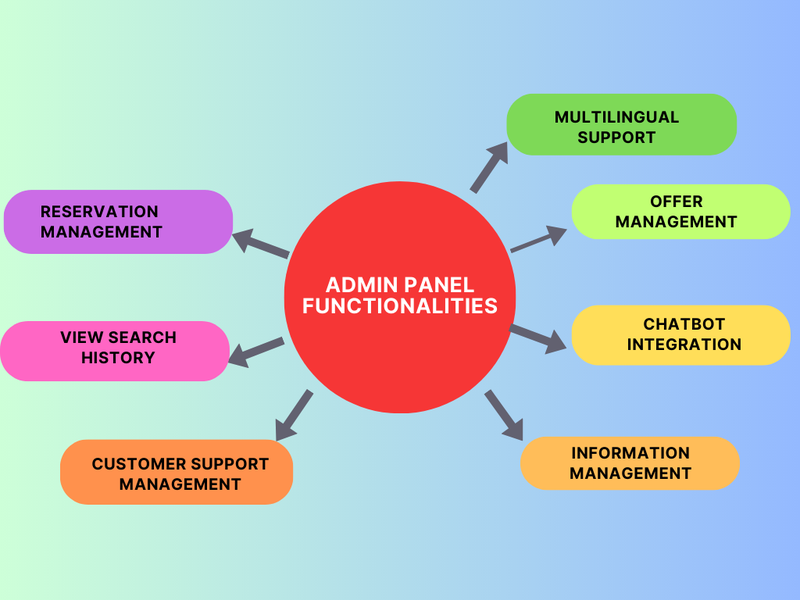
Multilingual Support:
Provide admin users with the ability to manage and support multiple languages, catering to a diverse user base and ensuring effective communication.
Offer Management:
Allow admins to create and manage promotional offers, discounts, or special deals to attract and retain customers.
Chatbot Integration:
Incorporate a chatbot feature that can assist customers with inquiries, provide support, and guide them through the booking process.
Information Management:
Enable admins to efficiently manage and update crucial information, such as flight details, pricing, and policies, ensuring accurate and timely information for customers.
Customer Support Management:
Provide tools for admins to effectively handle customer inquiries, complaints, and support requests, ensuring high-quality customer service.
View Search History:
Allow admins to access and analyze user search history, gaining insights into user preferences and behavior to improve the app's functionality and offerings.
Reservation Management:
Empower admins to manage and monitor flight reservations, including booking modifications, cancellations, and resolving any issues that may arise.
Advanced Functionality in Flight Booking Applications
To truly stand out from the competition, flight booking apps can offer advanced features that take the user experience to the next level. Some of these features include:
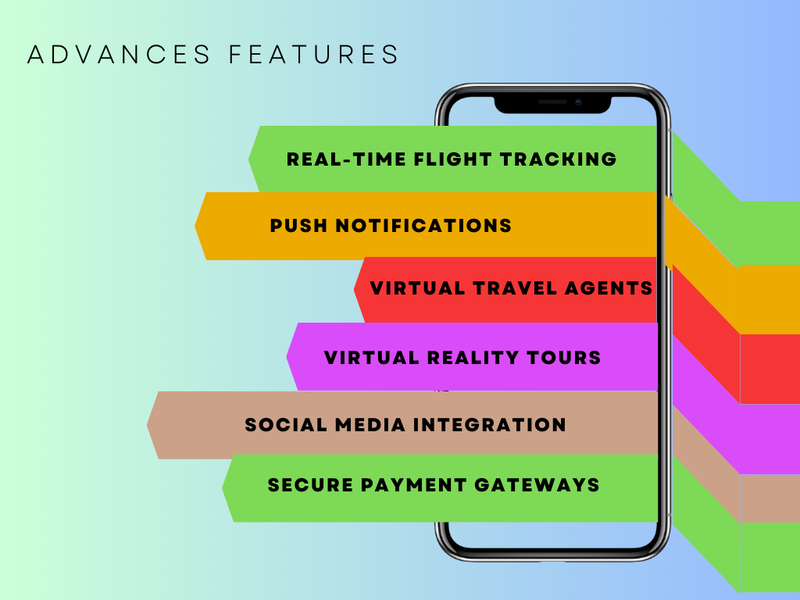
Real-time Flight Tracking:
Empower users to track their flights in real time, allowing them to stay updated with any delays or changes.
Push Notifications:
Send timely notifications to users regarding booking confirmations, flight updates, gate changes, and special offers.
Virtual Travel Agents:
Incorporate AI-powered virtual travel agents that can provide personalized recommendations, suggest itineraries, and assist with travel planning.
Virtual Reality Tours:
Offer users immersive virtual reality tours of destinations, allowing them to explore and visualize their travel experience before making bookings.
Social Media Integration:
Enable seamless integration with social media platforms, allowing users to share their travel plans, reviews, and experiences with their networks.
Secure Payment Gateways:
Ensure the integration of secure payment gateways with SSL encryption to guarantee safe and convenient transactions for customers.
By including these advanced features, a flight booking app can provide a unique and delightful user experience, setting itself apart from competitors in the market.
Technology Stack for Flight Booking App Development
When it comes to building a booking app, choosing the right technology stack is crucial. Let's dive into the recommended options for the backend, frontend, and database, and understand why scalability, security, and performance are important considerations.
Backend Technologies:
For the backend, popular choices include Node.js, Ruby on Rails, or Django. These frameworks offer flexibility, robustness, and scalability, allowing you to handle a large number of requests efficiently.
Frontend Technologies:
When it comes to the front end, technologies like React Native or Flutter are worth considering. These frameworks enable you to build a cross-platform app, ensuring compatibility across different devices and delivering a seamless user experience.
Database Options:
The choice of a database depends on your specific requirements. For structured data, relational databases like PostgreSQL or MySQL are reliable options. For unstructured data, a NoSQL database like MongoDB or Firebase can provide scalability and flexibility.
Factors Affecting the Cost of Flight Booking App Development
The average price to develop a scalable flight Booking app is around $10-15 US dollars. To tell what will be the actual cost of developing a flight booking app is not so easy and straightforward as there are so many factors that influence it directly or indirectly. Let's explore these factors that influence the overall cost:
UI/UX Design:
A well-designed and intuitive user interface is essential for a seamless booking experience. The complexity and intricacy of the design elements can impact the development cost.
Underlying Platform:
The choice of platform, whether it's iOS, Android, or both, can affect the development cost. Each platform has its own development requirements and considerations.
Team Size:
The size and expertise of the development team play a role in determining the cost. More experienced and skilled developers may command higher rates.
Agency Location:
The geographic location of the software development agency can impact the cost. Rates can vary based on the country or region where the development team is located.
Maintenance:
Ongoing maintenance and support for the app are important considerations. Regular updates, bug fixes, and feature enhancements may add to the overall cost.
Tech Stack:
The selection of technologies and frameworks used in app development can influence the cost. Some technologies may require more specialized knowledge or licenses, affecting the development expenses.
Feature List:
The complexity and number of features desired in the app can impact the cost. Advanced functionalities and integrations may require more development effort.
Conclusion:
In conclusion, developing a flight booking mobile app offers numerous benefits, from convenience and 24/7 customer service to time-saving features and hassle-free cancellations. The market statistics indicate its growth potential and profitability.
At Decodermind, we understand the ins and outs of app development and are the ideal partner for your next flight booking mobile app. With our expertise and commitment to quality, we ensure a seamless user experience, advanced features, and timely delivery. Choose Decodermind for a successful app development journey.

 Hamid Salman
Hamid Salman